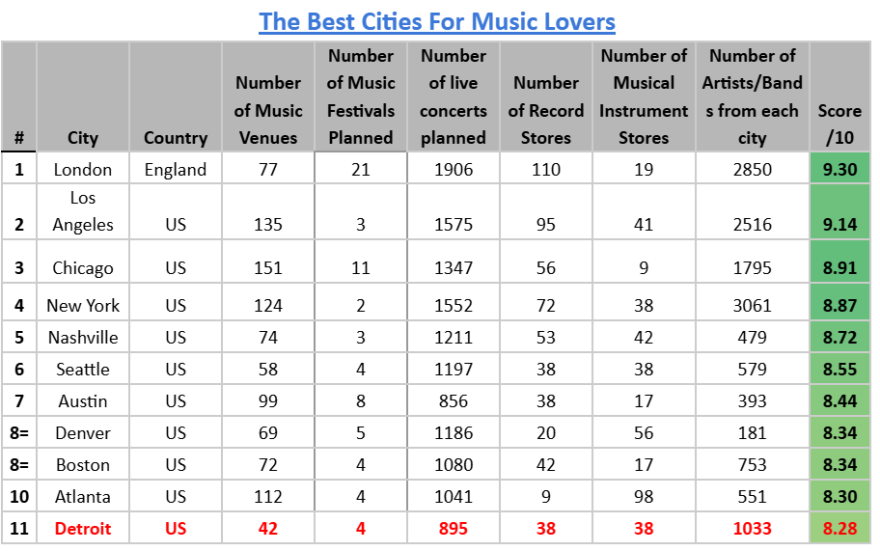Detroit is the eleventh-best global hotspot for music lovers, according to data from the ticket search engine SeatPick.
Components of the score include music venues, planned live concerts, record stores, instrument stores, and musical acts.
“Detroit Sound Conservancy is an organization that adamantly believes that Detroit is the most influential, innovative and important music city in the world,” said Jonah Raduns-Silverstein, Director of Operations with Detroit Sound Conservancy.

Despite Detroit’s immense contributions to global music—Motown, techno, jazz—it isn’t always considered a "music city" like Nashville, Austin, or New Orleans by the people that call Detroit home.
Because music is abundant in and around Detroit, Raduns-Silverstein said it can be taken for granted. Growing up in the city, my high school cello teacher was also in the orchestra pit at the Fisher Theatre. Plenty of my family friends played in venues around town.
“In some ways it's like talking to a fish about water, because when you're surrounded by water and you're a fish, you don't really notice the water around you. And in some ways, I think that's what music is in Detroit, where music is just everywhere in everybody's bones,” Raduns-Silverstein said.
Saving Detroiters’ musical collections and connections
The Detroit Sound Conservancy is trying to change that by safeguarding artifacts, recordings, and oral histories.
For Michelle McKinney, Director and Director of Collections, the mission is personal. Her late husband, jazz pianist Harold McKinney played with John Coltrane, Wes Montgomery, Marcus Belgrave, Wendell Harrison and Phil Ranelin. Harold McKinney also helped establish jazz music programs at Oakland University and Wayne State University.

“When he passed away … a lot of his music was ruined because it was in the basement in a flood, “McKinney said. “This was a great man who did like over 300 pieces of music and I have maybe, maybe 15 left. It’s sad. And so I'm just thinking about all the attics in all the basements in Detroit, and they're prone to flood,” she added.
Just this year, more than 200 families in Southwest Detroit were forced to move temporarily when a 54 inch water main broke.
But more than collecting, Detroit Sound Conservancy is helping Detroiters preserve their own collections and connections with the city’s rich music history.
“You don’t have to give it to us. We're not here to collect all this stuff and hold it like a museum or something. We're here to help you save it,” McKinney said. “That's what we're here for, to teach you that you are an archivist and you have the responsibility of your voice,” she said.
The Detroit Sound Conservancy recommends protecting tapes, vinyl records, and any other recording equipment from high temperatures and high humidity. The colder and drier the better for storing analog material long term.
The collections housed by the Detroit Sound Conservancy include Blues, Country, Gospel and recorded interviews.
Restoration of Detroit’s Blue Bird Inn jazz club
The group is also investing in the restoration of the Blue Bird Inn. The jazz club opened in 1937, and it was a popular Detroit music venue - especially bebop jazz in the 1940s and 50s. Over the years, it attracted musicians from around the world, and local legends like Pepper Adams, Terri Allen, Benny Benjamin, Donald Byrd, Paul Chambers, James Jamerson, and so many more.
The Blue Bird Inn closed in the early 2000s and fell into disrepair.
Detroit Sound Conservancy started rehabbing the stage nearly a decade ago and bought the Blue Bird Inn in 2019. The next year it was designated a local historic district. The Detroit Sound Conservancy continues to preserve its history, gathering archival materials and aiming for National Register recognition.
When the Bluebird Inn reopens in 2026, Detroit will gain another music venue.
But it’s still going to take more investment for Detroit to become a bigger destination for music lovers.
“When you think about other quote-unquote music cities, they have invested significantly into music as a means of cultural production, as a means of tourism, as a means of economic development that Detroit has not done,” Raduns-Silverstein said.
Later this year, Detroit rock band The White Stripes are headed to the Rock & Roll Hall of Fame, becoming the 22nd Detroit artist to be inducted. The duo will join legends like Aretha Franklin and Stevie Wonder. It's another notch in Detroit’s truly global musical contributions.





